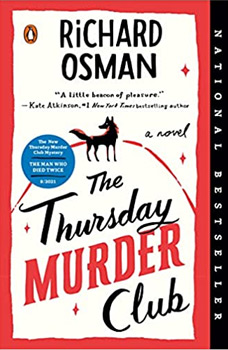Summary | Excerpt | Reading Guide | Reviews | Beyond the Book | Read-Alikes | Genres & Themes | Author Bio

This article relates to The Thursday Murder Club
 In Richard Osman's The Thursday Murder Club, the residents of the Coopers Chase retirement community are, in some ways, very much like any other group of retirees. They fawn over their grandchildren, they gather to discuss various aches and pains, and they frequently misunderstand technology. And like many other retirees, they also have decades of experience and expertise from their earlier lives and professions. One of the professions that stands out as particularly useful in the group's amateur pursuit of criminals is Red Ron's former life as a British Trade Union leader.
In Richard Osman's The Thursday Murder Club, the residents of the Coopers Chase retirement community are, in some ways, very much like any other group of retirees. They fawn over their grandchildren, they gather to discuss various aches and pains, and they frequently misunderstand technology. And like many other retirees, they also have decades of experience and expertise from their earlier lives and professions. One of the professions that stands out as particularly useful in the group's amateur pursuit of criminals is Red Ron's former life as a British Trade Union leader.
Although trade unions were not officially legal in the U.K. until the mid-19th century, the country had a prior history of movements for workers' rights, perhaps the most notable being the Luddite rebellion of 1811. The Luddites were a group of organized workers centered in Manchester, England who routinely sabotaged or destroyed factory machinery in protest of the industrialization that threatened jobs and jeopardized long lineages of skilled labor that was typically passed from parent to child. The Scottish rebellion of workers known as the 1820 Uprising or the Radical War is another example. The "War," centered in Glasgow, was actually a week of protests over low wages and high food prices and it ended in clashes between workers and government forces. After years of sporadic unrest, labor unions were finally legalized by royal commission in 1871. Because of their strength in numbers, the Labour Party (which remains one of the major political parties in the U.K.) was established in 1900 to advocate for the rights of the average working person.
Women, though not strongly featured in most histories of unionism in the U.K., were also powerful actors on this stage. In their article "Women's Labour and Trade Unionism," researchers Nicole Busby and Rebecca Zahn explain, "Women have played a key role in the British trade union movement since its inception. After all, the first strike for equal pay was organised by 1,500 women card-setters in Yorkshire in 1832." They go on to detail the dual-sided fight that women unionists had in securing fair and safe working conditions for all while being simultaneously undercut by men who were threatened by the presence of women in the workforce and in positions of power.
The next two significant periods for unions in the U.K. came in the 1920s and 1940s. In the 1920s, the rise of communism around the world radicalized unions throughout the U.K. and there were mass protests and calls for economic reform to provide better wages for workers. This movement was stamped out relatively quickly, and the Trade Disputes and Trade Unions Act of 1927 restricted unions' ability to strike and/or picket. The 1940s saw a resurgence of interest in unions and workers' rights, and this period boasts the largest numbers of union members in the U.K.'s history.
By the time we get to what would have been Osman's character Red Ron's heyday in the 1980s and 1990s, union strength and numbers were actually on the decline in the U.K. The election of Margaret Thatcher and her conservative ideology helped loosen corporate restrictions that were intended to protect workers' rights. This is not to say Red Ron's real-life counterparts were completely toothless, however, and the Labour Party is one of the two major parties in U.K. politics. (Labour has been in power 12 of the last 30 years and the leading opposition in the remainder.) Len McClusky is one of the most important figures in the Party and the world of British unions today. He's been a union member and advocate for workers' rights since the 1970s and has served as the general secretary of the second-largest trade union in the U.K., Unite the Union, since 2010.
Filed under Society and Politics
![]() This "beyond the book article" relates to The Thursday Murder Club. It originally ran in October 2020 and has been updated for the
August 2021 paperback edition.
Go to magazine.
This "beyond the book article" relates to The Thursday Murder Club. It originally ran in October 2020 and has been updated for the
August 2021 paperback edition.
Go to magazine.
Your guide toexceptional books
BookBrowse seeks out and recommends the best in contemporary fiction and nonfiction—books that not only engage and entertain but also deepen our understanding of ourselves and the world around us.